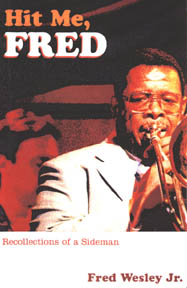 Fred Wesley Jr.
Fred Wesley Jr. Fred Wesley Jr.
Fred Wesley Jr.Fred mentions early on that he is blessed with a God-given ear: he is also blessed with a God-given memory. Recalling names from over forty years ago to give a graphic description of black Jazz in Alabama indeed, this section could be the basis of a documentary. His sharp awareness noted the personalities who marked his early experiences as he started the great roller coaster ride that was to be his life-long love of Jazz (he considered his first real jam session to be on a par with sex).
By the age of fifteen he had an overwhelming consuming passion for Jazz. He writes factually, dropping droll gems with an understated humor. He was on track to become the first black milkman in his hometown a crossroads crisis milk or music?
He knew where he wanted to go, but life ain't that simple. There has long been an argument about just how much influence human beings have in controlling their own fate and destiny the answer always seems to be the same not very much.
Fred did his best, but most of the time could not quite make it. Knowing that in the idiosyncratic world of a traveling Jazz musician, if times were good or bad, neither was going to last very long. Coupled to the bizarre methods of getting paid if you got paid at all it added up to the need of having a very strong constitution.
Perhaps the strongest influence in his career was his association with James Brown, the Godfather of Soul. Here he became instrumental in creating Funk and was central to its development. His relationship with Brown not so much love and hate, more disgust and respect, was wonderfully funny and scary at the same time. Trying to find out how the man ticked turns him into a psychoanalyst as he desperately tries to make sense of it all. While all this was going on he was creating a funk sound that was never bettered.
He picked up knowledge and understanding as he went along; his time in the Army, with Ike and Tina Turner, the Count Basie band. His learning and understanding of recording sessions all helped to mould the man. The efforts he had to make to just earn a living are explained at length. His fall into the pit of despair and his subsequent fight to re-establish himself as a force in the music world makes for some honest writing.
In a book like this, it is difficult to hide yourself without the whole thing seeming false. This is not the impression that Fred gives. One has the feeling of an all-round sort of guy, intelligent, perceptive, someone who likes people and can see good things in them, perhaps a trifle arrogant but that's a small price to pay in fact an absolute prerequisite for the life he took on.
This book will interest musicians and Jazz enthusiasts alike; it contains so much detail, so many names and it is possible to taste the flavor of the sort of life you lead if you have a consuming passion for your music.
by Ferdinand Maylin
Back to
![]() Contents Page
Contents Page
Jazz Now Interactive
Copyright Jazz Now, September 2002 issue, all rights reserved
jazzinfo@jazznow.com